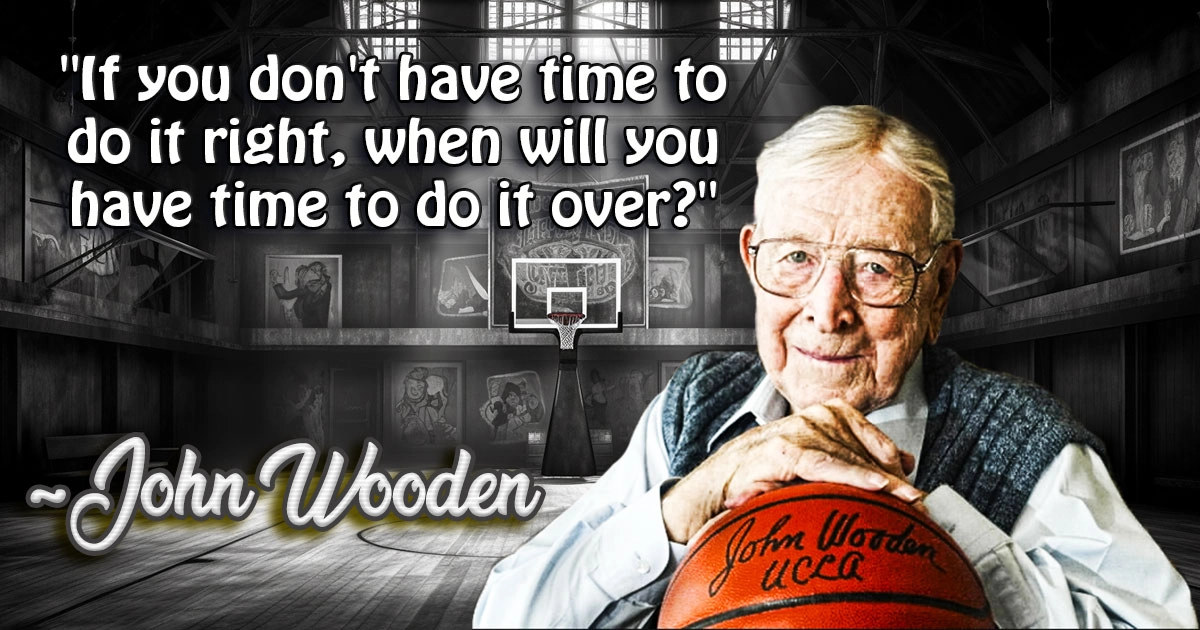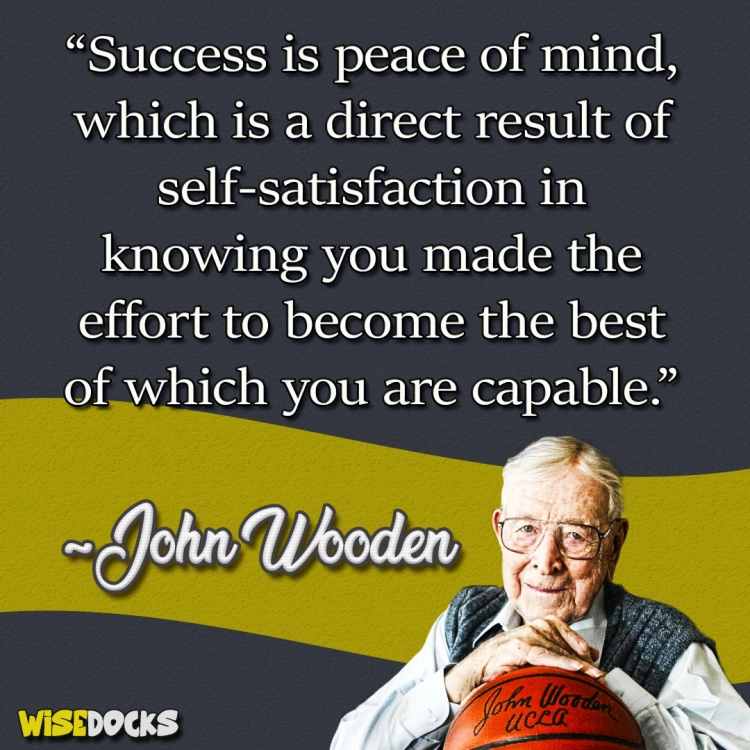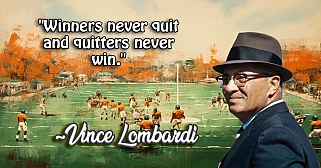John Wooden: The Architect of Excellence

John Wooden
John Wooden, known as the "Wizard of Westwood," was not just a basketball coach; he was a builder of men, an architect of excellence, and a symbol of integrity in the world of sports. His life story is one of perseverance, humility, and an unwavering commitment to principles that transcended the basketball court. Wooden's journey from a small-town boy in Indiana to becoming one of the greatest coaches in the history of sports is a testament to the power of character, dedication, and wisdom.

Early Life and Influences
John Robert Wooden was born on October 14, 1910, in the tiny town of Hall, Indiana. He grew up in a rural farming family, where hard work and discipline were not just virtues but necessities. His father, Joshua Wooden, was a significant influence on young John. Joshua, though not wealthy, was rich in wisdom and imparted life lessons that would shape Wooden’s future. One of the most memorable gifts from his father was a piece of paper with a simple but profound creed:
- Be true to yourself.
- Help others.
- Make each day your masterpiece.
- Drink deeply from good books, especially the Bible.
- Make friendship a fine art.
- Build a shelter against a rainy day.
- Pray for guidance and give thanks for your blessings every day.
These principles became the cornerstone of Wooden's philosophy, guiding him not only in basketball but in every aspect of his life.

The College Years
Wooden attended Martinsville High School, where he led the basketball team to three consecutive Indiana State Championship games, winning the title in 1927. His prowess on the basketball court earned him a scholarship to Purdue University, where he played under Coach Ward "Piggy" Lambert. Wooden was an All-American guard at Purdue, known for his leadership, tenacity, and basketball IQ. He helped Purdue win the 1932 national championship, and his playing style earned him the nickname “The Indiana Rubber Man” due to his durability and resilience on the court.
It was during these formative years that Wooden began to understand the importance of teamwork, discipline, and preparation. His coach, Lambert, emphasized a fast-paced style of play and the importance of conditioning, ideas that Wooden would later incorporate into his own coaching philosophy.

Early Coaching Career
After graduating from Purdue, Wooden began his coaching career at Dayton High School in Kentucky in 1932. He moved on to South Bend Central High School in Indiana, where he built a successful program, winning numerous championships. Wooden's coaching style was already unique; he emphasized fundamentals, discipline, and the development of character over winning at all costs.
World War II interrupted his coaching career, and Wooden served as a lieutenant in the United States Navy. After the war, he returned to coaching, taking over at Indiana State Teachers College (now Indiana State University). Wooden led the team to a 47-14 record over two seasons and even turned down an invitation to the National Association of Intercollegiate Athletics (NAIA) tournament because the tournament would not allow his one black player, Clarence Walker, to participate. This decision was a clear demonstration of Wooden’s principles and his commitment to fairness and equality.

The UCLA Years: Building a Dynasty
In 1948, Wooden was offered the head coaching position at UCLA, a program with little basketball success. Wooden accepted the challenge, but the early years were tough. The team practiced in a small, antiquated gym, and the facilities were far from what one would expect of a championship-caliber program. However, Wooden’s perseverance and dedication began to pay off. He instilled a culture of discipline, hard work, and respect for the game.
Wooden's practices were legendary. He meticulously planned each session down to the minute, emphasizing fundamentals, conditioning, and teamwork. One of Wooden's famous teachings was that the little things make the big things happen. He believed that success was the result of countless small efforts, all strung together, and that there were no shortcuts to greatness.
In 1964, Wooden led UCLA to its first NCAA championship, with an undefeated 30-0 record. The Bruins played a fast-paced, full-court press game that overwhelmed opponents. This was the beginning of one of the most remarkable dynasties in sports history. Under Wooden’s leadership, UCLA won 10 NCAA championships in 12 years, including seven consecutive titles from 1967 to 1973. During this period, the Bruins had a 38-game winning streak and an 88-game winning streak, both records that still stand.

The Pyramid of Success
While Wooden's coaching accomplishments are extraordinary, his most enduring legacy is perhaps his "Pyramid of Success," a conceptual framework he developed to define the building blocks of success, not just in sports, but in life. The Pyramid of Success consists of 15 blocks, each representing a fundamental principle:
- Industriousness: There is no substitute for work. Worthwhile results come from hard work and careful planning.
- Friendship: Friendship comes from mutual esteem, respect, and devotion. It must not be taken for granted but requires a joint effort.
- Loyalty: To yourself and to all those dependent upon you. Keep your self-respect.
- Cooperation: With all levels of your co-workers. Listen if you want to be heard. Be interested in finding the best way, not having your own way.
- Enthusiasm: Your energy and enjoyment, drive and dedication will stimulate and greatly inspire others.
- Self-Control: Practice self-discipline and keep emotions under control. Good judgment and common sense are essential.
- Alertness: Be observing constantly. Stay open-minded. Be eager to learn and improve.
- Initiative: Cultivate the ability to make decisions and think alone. Do not be afraid of failure, but learn from it.
- Intentness: Set a realistic goal. Concentrate on its achievement by resisting all temptations and being determined and persistent.
- Condition: Mental-Moral-Physical. Rest, exercise, and diet must be considered. Moderation must be practiced. Dissipation must be eliminated.
- Skill: A knowledge of and the ability to properly and quickly execute the fundamentals. Be prepared and cover every detail.
- Team Spirit: A genuine consideration for others. An eagerness to sacrifice personal interests of glory for the welfare of all.
- Poise: Just being yourself. Being at ease in any situation. Never fighting yourself.
- Confidence: Respect without fear. May come from being prepared and keeping all things in proper perspective.
- Competitive Greatness: Be at your best when your best is needed. Enjoyment of a difficult challenge.
At the top of the pyramid is "Competitive Greatness," which Wooden defined as the ability to be at your best when your best is needed. However, Wooden emphasized that the foundation of the pyramid—Industriousness and Enthusiasm—was critical. Without a solid foundation, true success was unattainable.
Beyond Basketball
Wooden retired from coaching in 1975, after leading UCLA to its 10th national championship. However, his influence only grew in retirement. Wooden became a sought-after speaker and author, sharing his wisdom and philosophy with audiences around the world. He wrote several books, including "They Call Me Coach" and "Wooden: A Lifetime of Observations and Reflections On and Off the Court," which became bestsellers.
Wooden’s teachings transcended basketball, resonating with people in all walks of life. He often said that his greatest joy came not from the championships, but from the success and happiness of the players he coached. Wooden maintained relationships with many of his former players, who continued to seek his guidance long after their playing days were over.
John Wooden was also known for his humility and simplicity. Despite his success, he lived a modest life, residing in the same two-bedroom condo in Encino, California, until his death. He never sought the limelight and was always quick to deflect credit to others. Wooden was a devout Christian, and his faith was a cornerstone of his life. He attended church regularly and often spoke of the importance of prayer and gratitude.
Legacy and Impact
John Wooden passed away on June 4, 2010, at the age of 99, but his legacy lives on. He is widely regarded as one of the greatest coaches in the history of sports, but more importantly, he is remembered as a teacher, mentor, and role model. Wooden’s influence can be seen not only in the lives of his former players but in the countless people who have been inspired by his books, speeches, and philosophy.
Wooden’s Pyramid of Success continues to be used as a blueprint for personal and professional development in various fields, from business to education to sports. His teachings on leadership, teamwork, and character have left an indelible mark on the world.
Former UCLA player Kareem Abdul-Jabbar, who went on to become the NBA’s all-time leading scorer, once said, "Coach Wooden taught us that the truly important things in life are how you behave, how you treat others, and how you live your life. The wins and losses were important, but they weren’t what defined Coach Wooden. It was his integrity, his kindness, and his love for his players that made him great."
Another of Wooden's players, Bill Walton, who also became a basketball legend, said, "Coach Wooden was more than a coach. He was a father figure, a mentor, and a teacher. He taught us how to be good people, how to live our lives the right way. I am forever grateful for the lessons he taught me, both on and off the court."
Wooden’s impact on the game of basketball is undeniable. His coaching techniques, his emphasis on fundamentals, and his fast-paced style of play have influenced generations of coaches. Many of Wooden’s former players and assistant coaches have gone on to successful coaching careers, spreading Wooden’s philosophy to new generations of players.
But perhaps Wooden’s most significant legacy is the example he set as a person. In a world where winning is often seen as the ultimate goal, Wooden reminded us that how we win—and how we live—is what truly matters. He showed us that success is not measured by trophies or accolades, but by the quality of our character and the positive impact we have on others.


